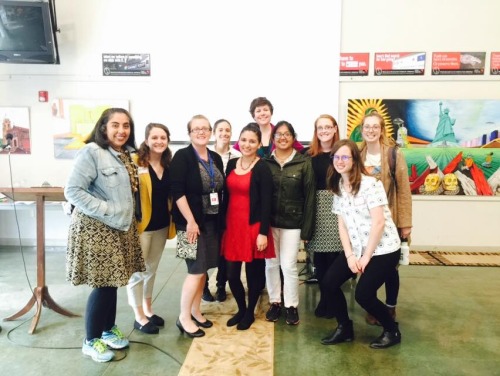What Makes the North Carolina Farmworker Institute Unique
 Friday, April 24, 2015 at 11:17AM by
Friday, April 24, 2015 at 11:17AM by  Jennie Belle
Jennie Belle On April 16, more than 150 farmworker advocates gathered at the United Church of Chapel Hill to network with each other and learn about issues affecting farmworkers. Workshops included an update on how DACA and DAPA expansion will affect farmworkers, an explanation of the Affordable Care Act in relation to farmworkers, and a discussion of camp access and using songwriting as an outreach tool with farmworkers. The keynote speaker, Neftali Cuello, a farmworker youth and activist, delivered a powerful spoken word poetry piece about her experiences in the fields and the need for justice for farmworkers. It was a beautiful day of learning new things, sharing experiences, challenging assumptions, and growing in both faith and practice.
In its sixth year, the Farmworker Institute developed out of programs of the NC Council of Churches Farmworker Ministry Committee. Today the annual summit has expanded to include people working in health outreach, legal services, advocacy, and faith (I met some wonderful people of faith, including a representative of the Society of St. Andrew’s and a group from Church Women United). What grew out of Jesus’ Good News to the poor and oppressed now includes all who are motivated to seek justice for the oppressed and to advocate for fair wages and work with dignity.
Another exceptional aspect of the Farmworker Institute is that it incorporates the voices of farmworkers themselves. This year 22 farmworkers attended the event and received training about their rights and reported back to decision makers about what their needs are. This was my third year attending the event and my first year serving on the Planning Committee; every year I continue to be impressed by the skills, knowledge, and resources of the other farmworker advocates in North Carolina. In fact, the very first South Carolina Farmworker Institute is taking place this month, demonstrating the importance of an event such as this. The NC Farmworker Institute truly embodies Cesar Chavez’s words about the message of Jesus: “He is calling us to ‘hunger and thirst after justice’ in the same way that we hunger and thirst after food and water: that is, by putting our yearning into practice.”

The 2015 NC Farmworker Institute Planning Committee









Reader Comments